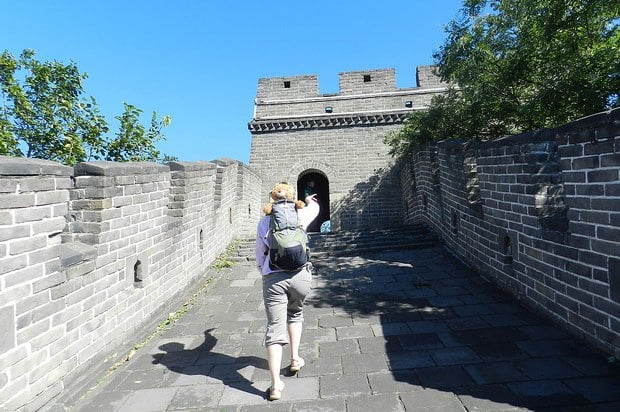International Citizen Service: An ICS volunteer story
International Citizen Service (ICS) is a UK government funded scheme enabling young people to volunteer overseas for three to six months. It's not anything like a holiday though. Ben, now in his first year at the University of Bath, tells us why he became an ICS volunteer and what it’s like.
True Stories

Why did you choose International Citizen Service?
First off I should let you know the basics . The International Citizen Service is funded by the UK government, specifically the department for international development, and led by VSO. So as long as you’re living in the UK and 18-35 years old, even if you’re an EU or EEA citizen, you can take part in ICS.
I wanted to do something useful abroad instead of being just another tourist. I wasn’t looking for a team leader placement or anything, just a 10-12 week volunteering programme. The problem was that most volunteering programs offered by large organisations, including development organisations, seemed very expensive. Luckily, I found out about International Citizen Service (ICS) after a bit of googling, and it seemed perfect. Sure, you have to raise money, but it all goes towards your living costs and the community you’re working in. Plus you’re not taking away work from locals.
How did ICS prepare you for going abroad?
I was invited to a selection day by Raleigh, which runs ICS in India. They interviewed me about my interest in volunteer placements and my past experience. After I was accepted to be an ICS volunteer there was one training weekend in the UK. If you’re interested, this can take place anywhere across Scotland, Northern Ireland, England and Wales. Then I did a couple of fundraisers. I’d advise anybody considering the program to expect to raise at least some money through working – tryna fundraise £900-£1500 means selling a lot of cakes.
Were there hidden extras?
No. All I’d say is to bear in mind that you’ll have to pay for quite a bit of kit. This includes a strong rucksack and hiking boots. Another tip is to research the country you’re being sent to; Raleigh sent me a generic kit-list for my trip to India that included a wooly hat and gloves (these were totally unnecessary). And it’ll probably be very difficult to get hold of anything whilst you’re there, so pack extra-everything if you’re not sure.
Is ICS full of ‘gap yah’ types?
I actually went with people from loads of different backgrounds from all over the UK. This ranged from people who’d been to top private schools to university graduates to people who started working at sixteen. We also worked with Indian volunteers once we got there. Honestly though it didn’t really matter where you came from. At the end of the day, everybody was committed to making a difference and up for the challenge; I was constantly impressed and inspired by their grit and work ethic. ICS is genuinely for everybody – remember, no matter your status back in the UK, you’re all just foreigners in another country!
Did you have a good time?
I’m not gonna lie, there were massive ups and downs. We all struggled with the heat, food and different cultural practices sometimes. To put it simply, ICS is not for the delicate and it’s certainly not a holiday. Volunteers work long hours which can be incredibly exhausting and even demoralising at times. But I also met some of my best friends along the way. Not to mention the people who completely humbled me with their generosity and courage.
What was the work like?
The start of the programme involved running lots of discussion sessions and taking surveys of what the villagers needed and wanted to improve. After the initial grunt work, we moved onto the bigger projects. In the end, with a local charity, we were able to run three health camps to teach kids about hand washing and brushing their teeth. We took part in sports and festivals too. Plus, as part of the programme, returned volunteers are asked to show how the program influenced them. In fact, I’m taking part in the Lord Mayor’s Show with Raleigh to help raise awareness of ICS.
Did you get to have any fun?
Outside of work, we had trips to Mysore, an elephant sanctuary, countless temples and religious monuments, and an unforgettable swimming ‘pool’. We also had some really fun parties during Holi (the festival of colours) and on volunteers’ birthdays.
Any major disasters?
Unfortunately, there was a Dengue fever outbreak and some of us got seriously ill. We had to evacuate the area, and it was tough moving to a new village. Although it did leave us with some interesting, to say the least, Indian hospital stories. Group issues also came to the surface and tested our camaraderie to the limit. Other upsets included a rabid dog in the village, fights over who deserved a toilet and some truly horrific sunburn (complete with pus-filled boils). I know that all sound pretty intense and kinda traumatising. But honestly knowing that we survived through it together made our friendship and determination all the greater.
What’s your advice to anyone interested in becoming an ICS volunteer and travelling to India?
Get used to being sociable, as there isn’t much privacy in an Indian village. You’ll constantly be surrounded by people and likely be working long hours too. I’d recommend doing some background reading or talking to past volunteers. That way you can learn what to expect. I’m not gonna sugarcoat it for you – conditions are tough and often unhygienic, so expect to be a bit smelly! But above all, just go with an open mind and aim to be positive from the start. You’ll be amazed at how that can change your entire perspective.
What impact has doing ICS had on you?
I feel much more independent now. I truly believe the experience was excellent preparation for university and living away. Plus, I made some amazing friends in India and got to see a totally different side of the world. All things considered, I’d recommend any hard working and travel-hungry UK volunteers to take part in ICS: you won’t regret it!
Want to find out more about volunteering? Check out The Mix’s volunteering resources here..
Next Steps
- Chat about this subject on our Discussion Boards.
By Ben Febvre
Updated on 04-Jun-2022
No featured article












